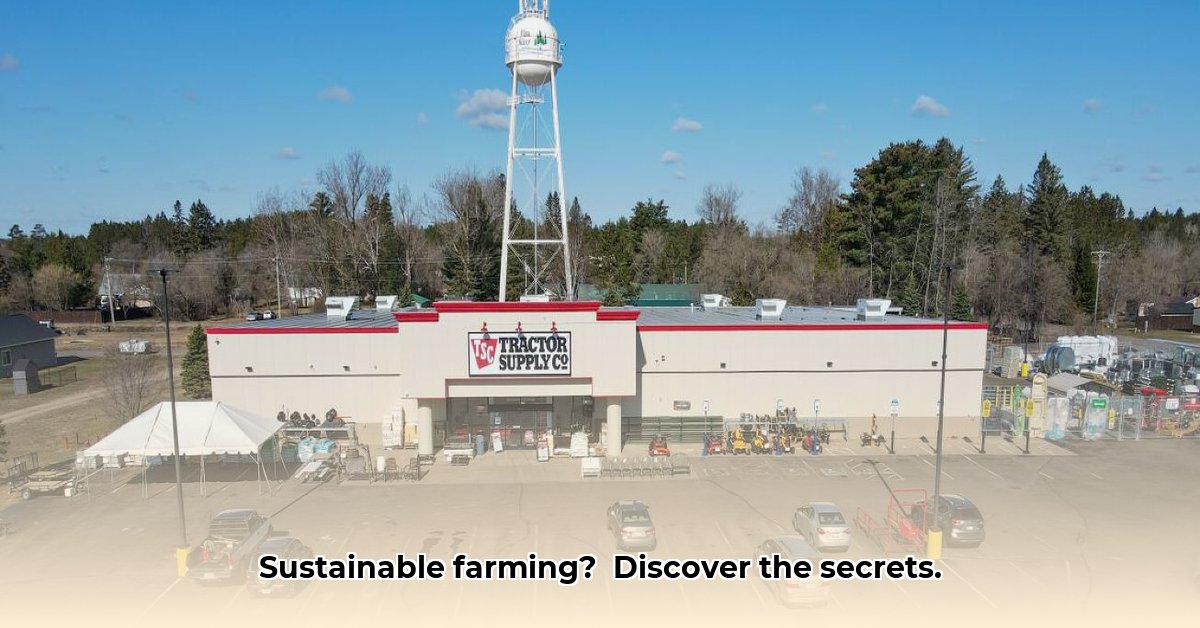
Accessing Sustainable Farming Essentials at Pine River Tractor Supply
Pine River Tractor Supply (PTS) offers a surprising array of resources for sustainable farming, positioning itself as a valuable partner for environmentally conscious farmers and gardeners. While not explicitly marketed as a "sustainable" retailer, PTS provides a wide range of products that directly support eco-friendly practices. This guide explores how you can leverage PTS's offerings to develop a more sustainable farm, regardless of your experience level. For larger spraying needs, check out this sprayer option.
PTS Products and Their Role in Sustainable Agriculture
How does Pine River Tractor Supply support sustainable agriculture? A significant contribution lies in their readily available product selection. For instance, efficient irrigation systems like drip irrigation and soaker hoses are crucial for minimizing water waste—a core component of responsible farming. Their availability at PTS directly supports water conservation efforts. This isn't just about saving water; efficient irrigation also leads to better crop yields and reduced operational costs. Did you know that efficient irrigation can boost yields by up to 20%?
Beyond water management, PTS offers natural and organic pest control options, reducing reliance on harmful chemical pesticides. This protects not only the environment but also the health of consumers. Additionally, the store's inventory often includes tools and supplies that promote soil health, such as compost, mulch, and equipment designed for no-till farming practices. These methods enrich the soil, reducing erosion and enhancing long-term productivity. Healthy soil means healthier plants and a reduction in the need for chemical fertilizers. The availability of a wide assortment of organic seeds further supports the principles of sustainable agriculture.
The Untapped Potential: Community Education and Engagement
PTS isn't just a supplier; it has the potential to become a valuable educational resource for sustainable farming practices. Many employees possess considerable agricultural knowledge accumulated over years of working with farmers and gardeners. This expertise, often untapped, presents a significant opportunity. Imagine the impact of in-store workshops or online resources demonstrating techniques for water conservation, organic pest management, and soil health improvement. This could significantly foster the adoption of sustainable practices within the wider community. What if PTS established partnerships with local agricultural extension offices to offer such educational opportunities?
Challenges and Opportunities for Growth
While PTS offers significant potential contributions to sustainable agriculture, there are areas for improvement. The company could greatly enhance its sustainability profile by providing more detailed information about the environmental impact of its products and supply chain (its "Scope 3 emissions"). Transparency regarding sourcing, packaging, and logistics would significantly boost consumer confidence and attract environmentally conscious farmers. A publicly accessible sustainability report, detailing metrics and goals, would represent a major step forward.
Actionable Steps for Sustainable Farming Using PTS Resources
Here’s a practical plan for incorporating sustainable practices into your farm using products readily available at PTS:
Optimize Water Usage: Assess your current irrigation system. PTS offers a variety of water-efficient options. Switching to drip irrigation or soaker hoses can significantly reduce water consumption while maintaining or even improving crop yields. This simple change can make a measurable difference in your overall water footprint.
Prioritize Soil Health: Investigate no-till farming techniques. PTS provides the equipment needed for successful implementation. No-till farming protects soil structure, reduces erosion, and enhances long-term fertility.
Embrace Natural Pest Control: Utilize organic and biological pest controls available at PTS. Minimizing synthetic pesticide use protects the environment and human health, resulting in safer and healthier crops.
Strategic Seed Selection: Choose seeds appropriate for your soil and climate, including organic options offered by PTS. This ensures optimal growth and minimizes the need for excessive inputs.
Implement Crop Rotation: Plan a diverse crop rotation using seed varieties available from PTS. This improves soil health, reduces pest pressures, and enhances biodiversity.
Conclusion: A Collaborative Approach to Sustainable Farming
Sustainable agriculture requires a collaborative effort. By consciously choosing sustainable products at PTS and actively supporting their efforts toward greater transparency, you are directly influencing their operations and contributing to a positive impact. Your choices matter. Let's work together to build a more sustainable and environmentally responsible local farming community. The future of sustainable agriculture depends on collective action.